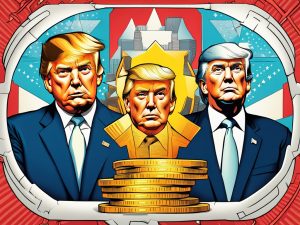IMF Reaches Agreement with El Salvador: A Shift in Economic Strategy 🌍
The International Monetary Fund (IMF) has informed that it has successfully established a staff-level agreement with El Salvador to provide a $1.4 billion loan as part of its Extended Fund Facility (EFF). This agreement is a step towards stabilizing the nation’s economic landscape and enhancing fiscal governance.
Key Details of the Agreement 📜
This year’s negotiation culminated in a significant arrangement that, while creating a pathway for financial assistance, mandates that El Salvador commit to various fiscal measures. The Executive Board of the IMF is anticipated to provide formal approval early in February 2025, contingent on the execution of prior agreed actions by El Salvador.
Among the necessary reforms, the agreement outlines specific areas for improvement aimed at elevating fiscal and economic stability in El Salvador:
- Fiscal Strategy:
- Aim to enhance the primary fiscal balance by around 3.5% of GDP over the course of three years.
- Methods include budgetary reforms such as reducing salaries, decreasing expenditure on goods and services, and minimizing transfers to local governments.
- Working towards the sustainability of the pension system and increasing revenue to ensure the national debt, expected to peak at 85% of GDP in 2024, Begins its descent.
- Transparency and Governance:
- Enhance fiscal transparency through better reporting related to national debt and state-owned enterprises.
- Prioritize anti-corruption initiatives and improve anti-money laundering standards.
- Financial Reserves and Buffers:
- Increase the liquidity requirements for banks from 11.5% to 15% of deposits by mid-2026.
- Aim to bolster the foreign reserves held by the central bank to tackle economic downturns more effectively.
- Climate Resilience and Business Environment:
- Continue modernizing infrastructure while decreasing bureaucratic hurdles.
- Implement strategies to tackle climate change with support from development partners.
Addressing Bitcoin Concerns 💰
The agreement targets the risks associated with Bitcoin utilization within El Salvador. The proposed reforms suggest substantial adjustments in how Bitcoin will function within the public and commercial sectors:
- Optional Adoption by Commercial Entities:
- While Bitcoin will still hold legal tender status, businesses will no longer be mandated to accept it, allowing for voluntary use.
- Reduced Government Involvement:
- El Salvador’s government plans to gradually withdraw from Bitcoin-related engagements, including phasing out the state-operated Chivo wallet.
- Tax obligations will be payable exclusively in U.S. dollars, effectively diminishing Bitcoin’s stature in public finances.
- Tighter Regulations and Enhanced Oversight:
- Implementation of strict regulatory frameworks for Bitcoin and digital assets aimed at maintaining financial stability and consumer protection.
- Increased transparency efforts will be put in place to align with global best practices.
Despite Bitcoin maintaining its legal tender status, these changes significantly constrain its practical application across various sectors. The move to eliminate mandatory acceptance and reduce governmental involvement indicates a pivot towards more traditional financial paradigms.
The Future of Bitcoin in El Salvador 🔮
As the landscape evolves, critics assert that the modifications undermine the original aspiration of securing Bitcoin as a foundational component within the national economy. Conversely, some supporters argue that these changes create a necessary balance, fostering innovation while prioritizing financial stability.
The agreement aims to revitalize El Salvador’s economy, restoring trust among investors. This includes objectives to mitigate public debt, improve fiscal transparency, and enhance financial resilience, ultimately aiming to draw in further international funding.
Hot Take: Navigating a New Era for El Salvador’s Economy 🌅
The alignment with the IMF signifies a transformative period for El Salvador, particularly considering the commitment to recalibrate its approach to Bitcoin. While its status as legal tender remains, its practical utility is poised for an overhaul. As external financial partnerships are reinforced, the nation stands at a crossroads of innovation and tradition.
To explore more on this subject, consider the following links:
IMF El Salvador,
Bitcoin Adoption,
El Salvador Economy.





 By
By
 By
By
 By
By
 By
By

 By
By